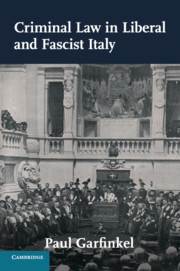(Source: Cambridge University Press)
Cambridge University Press just published the
paperback of a book on criminal law in liberal and fascist Italy, which we had
not yet reported on when the hardback was released in 2017.
ABOUT THE BOOK
By extending the
chronological parameters of existing scholarship, and by focusing on legal
experts' overriding and enduring concern with 'dangerous' forms of common
crime, this study offers a major reinterpretation of criminal-law reform and
legal culture in Italy from the Liberal (1861–1922) to the Fascist era
(1922–43). Garfinkel argues that scholars have long overstated the influence of
positivist criminology on Italian legal culture and that the kingdom's
penal-reform movement was driven not by the radical criminological theories of
Cesare Lombroso, but instead by a growing body of statistics and legal
researches that related rising rates of crime to the instability of the Italian
state. Drawing on a vast array of archival, legal and official sources, the
author explains the sustained and wide-ranging interest in penal-law reform
that defined this era in Italian legal history while analyzing the
philosophical underpinnings of that reform and its relationship to contemporary
penal-reform movements abroad.
ABOUT THE AUTHOR
Paul
Garfinkel, Simon Fraser University, British
Columbia
Paul Garfinkel is an Associate Professor of History at Simon Fraser University, British Columbia.
Paul Garfinkel is an Associate Professor of History at Simon Fraser University, British Columbia.
TABLE OF
CONTENTS
1. Body count
2. Civilized violence
3. Force of habit
4. Tomorrow's criminals
5. Grapes and wrath
6. Coup, casualty and catalyst: the Ferri Code, 1919–25
7. Fascism's legal Risorgimento, 1925–31
Conclusion.
2. Civilized violence
3. Force of habit
4. Tomorrow's criminals
5. Grapes and wrath
6. Coup, casualty and catalyst: the Ferri Code, 1919–25
7. Fascism's legal Risorgimento, 1925–31
Conclusion.


No comments:
Post a Comment